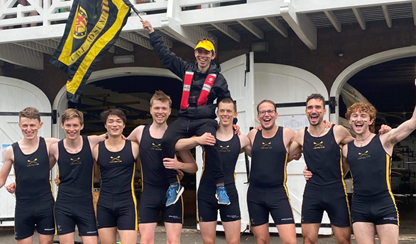
When our Cambridge University–Baker Institute exchange program’s Owen Taylor gets knocked down, he gets back up again. Owen’s route to one of the world’s leading universities has been far from ordinary — it’s been one of persistence and determination. And now, the disadvantaged and underserved are the beneficiaries.
Read about Owen’s journey to the Baker Institute as we go Fast Five with the PhD student from Wales.
You’ve had an interesting journey to reach this point in your career.
Tell us how you found yourself at Cambridge University?
My journey to studying at Cambridge involved many failures and greater successes. After being repeatedly told that I would fail high school science by teachers, it felt a pretty incredible achievement to be accepted to study Biomedical Science at the University of Leeds, UK. This itself came with challenges, and after not progressing to my second year, I was forced to pursue a different route. It was then that I decided to reapply to Leeds to study nutrition. There, I gained confidence in my academic ability and a deep interest in human health, allowing me to undertake a year abroad at Queensland University of Technology and a Wellcome Trust Biomedical Vacation scholarship, in which I gained biostatistics and machine learning experience.
After being encouraged to apply for postgraduate study in cardiovascular research at world leading universities, I applied and was interviewed for an integrated Masters and PhD at Cambridge, for which I was unsuccessful. During this interview, I met my current supervisor, Professor Angela Wood, who guided and encouraged me towards applying for a Masters in public health or epidemiology, but again, I was unsuccessful.
Rather fittingly, in March 2020, I was accepted to study a Masters in Epidemiology at the London School of Hygiene and Tropical Medicine. I knew I wanted to undertake a PhD in cardiovascular research with an ambition of studying at Cambridge. After a few unsuccessful applications and interviews, I was accepted for British Heart Foundation funding to undertake this PhD at Cambridge. Defiantly, a non-linear relationship after all!
You obviously don’t give up too easily, how do persistence and resilience help you with your research?
I think anyone who has or is undertaking a PhD knows that it can be a challenging and lonely at times. Feeling that your self-worth can be defined by your research outputs can be a difficult concept to overcome. I feel like my past experiences, though, have taught me to have a healthy relationship with my work-life balance. I find I gain clarity and self-worth from other aspects outside of my work when projects are moving slowly, or things go wrong. Saying this, I am very much enjoying my PhD and experience working at the Baker Institute. I find that the work is extremely rewarding but accept they can just take time.
How did you end up here at the Baker Institute?
I like to make the most of all opportunities and I thought that intermitting from my PhD would be a fabulous way to gain work experience. I am keen to travel and therefore suggested to my department about applying for an internship at the Baker Institute, due to the developing partnership between the two institutions. Because of the nature and similarities of my research, this internship became part of my PhD. My PhD research focuses on reducing health inequalities within shared decision making. My research here at the Baker Institute involves a qualitative study which aims to better tailor several visual formats for communicating cardiovascular disease risk to people with and without diabetes, and healthcare professionals.
While here, I am working with Melinda Carrington and her team on a qualitative study investigating barriers to participation in cardiac rehabilitation programmes. Cardiac rehab has been proven to lower individual risk of rehospitalisation due to coronary artery disease and offers flexible and tailored programmes to meet individual needs. The uptake of cardiac rehab is surprisingly low, so we wish to investigate individual barriers to participation with the aim of understanding how to better improve the model for implementing cardiac rehab in both research and the community setting.
What/who inspires you to do the work you do?
I feel inspired by all the people who have always believed in me, including my parents, tutors, and friends, and their kindness and willingness towards helping me. I feel extremely privileged that my upbringing brought me access to free healthcare and education. These privileges inspire me to conduct research that aims to improve the lives of those who are socially disadvantaged or underserved.
What are your thoughts of Melbourne and what do you do here when you’re not working?
I moved here with my partner, so I have spent a lot of time with him, exploring the food, music, art, and coffee that Naarm/Melbourne has to offer. In my spare time, you’ll find me cooking plant-based food with friends, dancing to Dua Lipa on Smith St, rowing on the Yarra, or jogging around Princess Park on the weekend. I’m also planning to run a half-marathon while I’m here after completing the London marathon last year. I want to take this opportunity to explore as much as I can. I’ve so far been along the Great Ocean Road, and I am looking forward to a trip up the east coast over Christmas with some friends from the UK.
After having previously lived in Brisbane for 12 months, I can say that I packed completely wrong for the southern Australian climate! Luckily, there are endless op-shops with incredible second-hand buys all over. I’m taken away by how fast paced but relaxing Naarm/Melbourne is to live in. I feel extremely grateful to working and living in this city, and I will be sad when it hits autumn and is time for me to return home to the UK.








